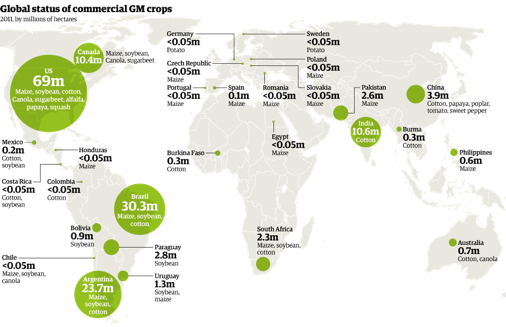Myths on hunger debunked:
GMOs are the solution to eradicate hunger
Myth 11: GMOs are the solution to eradicate hunger
Wrong.
GMOs are at the heart of many controversies, of which the most recent is the direct consequence of the study conducted by Prof. Séralini on the health impact of consuming Monsanto’s GMO maize NK603.
GMO supporters emphasise their potential in terms of fight against pests, resistance to herbicides or drought, improved assimilation of certain elements (P or N) or improvements in the nutritional value of products. They often justify the promotion of GMOs on the grounds that they will “reduce world hunger”.
Opponents of GMOs insist on the public health and environmental risks (for example because of an increased use of pesticides – see Greenpeace video) that these organisms create, as well as on the issue of private appropriation of the genetic composition of living organisms (e.g. seed companies such as Monsanto).
From the point of view of world hunger, it is important to consider whether GMOs can constitute a solution. Starting from the fact that hunger is essentially a question of distribution of wealth, of difficulty in access to food by a sizeable proportion of the population because of poverty, and considering that an important part of the undernourished earn their living from agriculture, it is possible to say:
• It is very unlikely that GOMs constitute a solution for people living from agriculture and suffering from hunger. Indeed, GMOs are accessible only though the purchase of seeds which requires financial resources that the concerned populations do not have. Moreover, as most of GMO seeds can only be used for one season (seeds kept from the previous harvest do not generally have the characteristics of purchased GMOs, or, if they do, the producer would need to pay a fee as GMOs are patented by private companies), the expense has to be repeated every year. Therefore the cost of using GMOs makes them inaccessible for poor farmers.
• A generalised use of GMOs by producers able to afford them could, if they live up to their breeders’ claims, imply a reduction of the costs of food. Poorer producers, who cannot afford GMOs, would then have problems to sell their produce at a remunerative price and would see their income reduced, making them poorer or inducing them to accelerate their movement out of agriculture.
• For those persons who are not suffering from hunger and who do not earn their living from agriculture, the reduction of the price of food that would be a consequence of the generalised use of GMOs, would have a positive impact on their real income (purchasing power), but with possibly increased health risks.
It appears therefore that the use of GMOs does not constitute a solution to hunger. In fact it is quite the contrary!

Source: IAAA/The Guardian
For more information read:
•Genetically modified crops FAO’s point of view (2001)
•Biotechnology: meeting the needs of the poor? (FAO 2004)
•http://www.greenpeace.org/international/en/campaigns/agriculture/problem/genetic-engineering/ Anti GMO website
•http://www.monsanto.com/newsviews/Pages/biotech-safety-gmo-advantages.aspx Pro GMO website
•Les OGM une solution au problème de la faim dans le monde ? ? ? (in French only)
(October 2012)
Last update: September 2013
For your comments and reactions: hungerexpl@gmail.com
Thirteen myths about hunger:
4. Food aid
6. Africa
8. Poverty
10. Price volatility
12. Organic agriculture cannot feed the world
